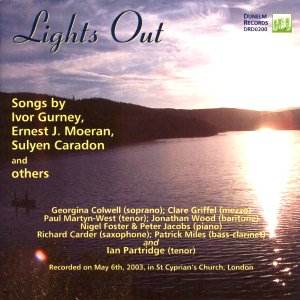This intriguing programme was given at St Cyprian’s
Church, Glentworth Street, London on 6 May 2003. It reaches me
for review exactly two months later – something of a record. Presented
under the auspices of the English Poetry and Song Society and
the British Music Information Centre the programme is a pleasing
mix of the known and the new, the established and the under performed.
The performers are in the main little known but they are without
exception acutely sensitive to the word setting whilst two names
will obviously stand out and they are Ian Partridge and Peter
Jacobs.
A thread running through that evening’s recital
was the name of Sulyen Caradon. Born in 1942 and of Cornish extraction
the songs here were written over a thirteen-year period and there
is also his little but effectively moving threnody for a friend
killed in a car crash, Dorian Dirge. He sets Rupert Brooke’s Clouds
with real acumen, not rising to the bait of painting the "noiseless
tumult" with anything other than discretion. The setting
does become increasingly active and the piano part does rise to
moments of declamation and drama but the "still-raging seas"
are as internalised as they are representative. I liked The
Dancer as well with its antique air but not as much as his
setting of Lascelles Abercrombie’s Margaret’s Song. Abercrombie
was one of the Georgian poets no one set – I only know of one
other setting of his poems and that’s Michael Head’s of Elizabeth’s
Song – so it’s doubly good to hear Caradon’s. It’s a tricky
poem to make work – try reciting the mildly tongue twisting Would
now the tall swift mists could lay…- but Caradon gives it
a befittingly undulatory rhythm, allowing its meaning to become
clear only at the end. The piano postlude is rightly elusive,
the setting sensitive and understanding. And Caradon can let his
hair down as well – witness de la Mare’s O Lovely England
in this setting for SATB, which is Old School with a vengeance.
Of the well known composers Paul Martyn-West
contributes Moeran’s Six Songs of Seumus O’Sullivan – less well
known actually than they should be. The high point for me was
Lullaby, sung with expressive interiority – though I also
admired his way with The Poplars where he shows a real
ear for poetry and for line. Jonathan Wood essays Gurney’s equally
under performed Lights Out, the cycle that gives this disc
its title and reference point. Wood is another of the singers
whose instincts are deeply musical and whose judgement is admirable
– his approach to Penny Whistle, in particular, is excellent
especially as it’s hard successfully to convey its atmosphere.
It’s unfortunate that his vibrato has so prominent a bleat and
that his legato is so compromised by it. Clare Griffel copes well
with her three Moeran settings even if she does come under some
strain and Georgina Colwell takes on the quartet of Whitton, Shur,
Rodgers and Caradon in her solo selection accompanied by Nigel
Foster. She has an appropriately edgy boyish tone for Whitton’s
Little Vagabond and though she’s taxed by the next Blake
setting, The smile by Laura Shur, she successfully conveys
its divided self.
Ian Partridge, one of the current Presidents
of The English Poetry and Song Society, is on hand to reprise
his famous Gurney songs. No, the voice is not as it was twenty
years ago - but whose is? The artistry is still spellbindingly
there. He is quicker and more emphatic now in Down by the Salley
Gardens than he was in his 1980 OUP LP – less the introspective
innocent, more the stricken knowingness of an older man. Twenty
years ago he sang All night under the moon with an almost
pristine simplicity. I enjoyed it then but I prefer him now –
now he is more overt and more romantically sweeping. Things are
more telling, detail is more sharply etched, experience is more
keen, life is more completely lived. Similarly Severn Meadows
is rather more nuanced now, and the concert setting adds a further
frisson to his elucidation of its pained nostalgia.
The booklet adds a caveat about some ambient
noise. It’s there, certainly, and one has to acknowledge the problems
of a live concert recorded in a church. Still, I’m used to much
worse when doing the rounds of off air and privately recorded
programmes and in the circumstances the engineers have done a
first rate job. The booklet prints all the texts and gives some
biographical detail about performers and some composers – the
"other composers" of the title have all been shortlisted
in the composers’ competition run by the English Poetry and Song
Society and I’d like to have known something, at least, about
them.
Jonathan Woolf


